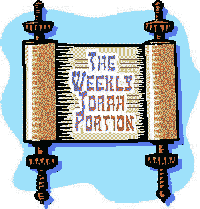Search our Archives:
» Home
» History
» Holidays
» Humor
» Places
» Thought
» Opinion & Society
» Writings
» Customs
» Misc.
|
The Guiding Light
By Michael Chessen
The Torah reading of "Pinchas" is one of individual initiative. We have
perhaps been left at somewhat of a loss in fathoming the brazen act of
Pinchas at the end of the portion of "Balak": the killing of a Jewish prince
and a Midianite woman who were publicly committing an immoral act. Although
his action appears to have halted a terrible plague, we still cannot know
that ends, however vital, justify such extreme and apparently self-initiated
means.
Especially against the backdrop of all of the preceding mis-deeds in the
book of Numbers, we have understandably become just a little wary of
"unscripted" initiative. Accordingly, the opening verses of Pinchas quite
strongly grab our attention by virtue of the fact that God here explicitly
bestows a holy stamp of approval on an individual’s actions. Though God has
certainly sent many signs through Moses and Aaron, these have primarily been
in order to convey messages pertaining to God and the Torah, rather than
express a specific message about the Jewish leaders themselves.
Although Pinchas merits God’s "covenant of peace" (Numbers 25:10), while his
zeal in the service of God is certainly worthy of emulation, in the course
of regular daily life, we cannot realistically expect to receive his kind of
"divine assurance" for any given action. Rather, the Ethics of the Fathers
instructs us to "make for yourself a rabbi" (as a teacher of advisor) and
"acquire a friend" (in order to benefit from his or her more detached
perspective).
In our Torah reading, the highly articulate and well-reasoned petition on
behalf of the daughters of Tzlefchad follows the actions of Pinchas as
perhaps a more exemplary course of personal initiative. In having worked
their way through the hierarchical advisory/judicial structure that Yitro
had advised and Moses instituted, they necessarily benefited from much
"rabbinical" guidance. And through they all had a common interest in the
outcome of their petition, their being five rather than one enabled them to
exchange "friendly" counsel between themselves.
In the context of these initiatives, Moses would seem poised to take an
initiative of his own, namely, appealing the decree preventing him from
entering the Land of Israel. Accordingly, God "pre-empts" Moses by
immediately following His response to the petition of the daughters of
Tzlefchad with the instructions that Moses ascend Mt. Nevo in order to view
the good land from afar before following his brother Aaron in taking leave
from this world. While accepting God’s final decree, Moses nevertheless
demonstrates initiative, not on his own behalf, but on behalf of the future
of the entire Jewish people. Moses’ selfless plea that the people not become
as "a flock without a shepherd" directly leads to the appointment of his
close student and protégé, Joshua, as his successor. This helps ensure that
even if Moses the man does not enter the land, the spirit of his guidance
will.
Wishing you all a Shabbat Shalom !

|
|
Please let us know if you see something unsavory on the Google Ads and we will have them removed. Email us with the offensive URL (www.something.com)
|





|
